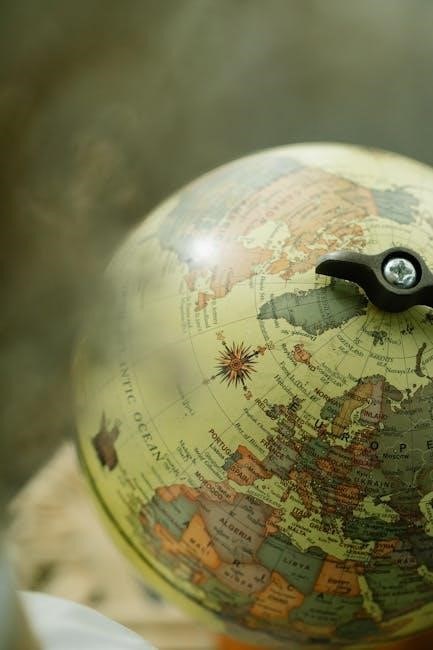This book by Tom Standage explores world history through six beverages: beer, wine, spirits, coffee, tea, and Coca-Cola. It highlights their cultural, economic, and social impacts.
Overview of the Book
A History of the World in 6 Glasses by Tom Standage offers a unique perspective on world history by focusing on six beverages—beer, wine, spirits, coffee, tea, and Coca-Cola. Each drink represents a distinct era, from ancient civilizations to modern globalization. The book explores how these beverages influenced cultural, economic, and social dynamics, shaping human progress and global connections. Standage’s narrative spans thousands of years, detailing the origins, spread, and impact of each drink. He illustrates how they served as catalysts for technological advancements, trade, and societal change. The book is both a historical account and a fascinating story of how everyday consumables have molded the world we live in today.
By weaving together history, science, and culture, Standage creates an engaging and accessible read that highlights the profound role of beverages in shaping humanity’s journey.
Author Background: Tom Standage
Tom Standage is a renowned British journalist, historian, and author, best known for his unique approach to exploring the intersection of history, science, and culture. With a background in science and technology, Standage has written for prominent publications such as The Guardian and The Economist. His work often delves into the overlooked yet profound influences of everyday items on global history. In A History of the World in 6 Glasses, Standage showcases his ability to blend meticulous research with engaging storytelling, making complex historical narratives accessible to a broad audience. His innovative perspective has earned him critical acclaim and a loyal readership, solidifying his reputation as a masterful historian and communicator.
Key Themes and Concepts
A History of the World in 6 Glasses by Tom Standage explores how six beverages—beer, wine, spirits, coffee, tea, and Coca-Cola—have shaped human history. Each drink represents a distinct era, from ancient civilizations to modern globalization. The book highlights the cultural, economic, and social transformations driven by these beverages, revealing their roles in trade, technology, and societal change. Standage examines how beer facilitated early agriculture and urbanization, while coffee sparked intellectual movements like the Enlightenment. The rise of Coca-Cola symbolizes the globalization of consumer culture. By linking drinks to historical milestones, the book offers a unique perspective on how everyday items have influenced the course of human progress, illustrating the interconnectedness of food, drink, and global history. This approach provides a fresh lens for understanding the complexities of human development and cultural evolution.

The Six Beverages That Shaped World History
Beer, wine, spirits, coffee, tea, and Coca-Cola are the six drinks that shaped global history, each influencing culture, trade, and society in unique ways.
Beer: The Drink of Ancient Civilizations
Beer played a pivotal role in the rise of ancient civilizations, particularly in Mesopotamia and Egypt. It was not only a staple drink but also a catalyst for technological and societal advancements. The invention of beer is linked to the domestication of barley and the development of fermentation techniques, which marked a significant shift from nomadic lifestyles to settled agriculture. Beer production facilitated the creation of surplus food, enabling early societies to specialize labor and establish complex administrative systems. It also served as a unifying force, fostering communal bonding and becoming a central element in religious and social rituals. The importance of beer extended beyond consumption, as it influenced trade networks and cultural practices, laying the groundwork for the emergence of urban centers and early class systems. Its legacy as a foundational beverage underscores its enduring impact on human history and development.
Wine: The Beverage of the Classical World
Wine emerged as a defining beverage of the classical world, particularly in ancient Greece and Rome. It was not only a drink but also a symbol of culture, religion, and social status. The Greeks revered wine as a gift from Dionysus, associating it with festivals, theater, and intellectual gatherings like symposia. Wine production and trade flourished, with regions like Greece, Italy, and Gaul becoming renowned for their vineyards. The Romans further expanded viticulture, spreading winemaking techniques across their empire. Wine played a central role in religious rituals, medical practices, and daily life, while also serving as a luxury item that highlighted social hierarchies. Its influence extended beyond consumption, shaping trade networks, cultural exchange, and even the spread of Christianity, as wine became a sacred element in religious ceremonies. The legacy of wine in the classical world underscores its enduring impact on Western civilization and global traditions.
Spirits: The Age of Exploration and Colonization

Spirits, particularly rum and brandy, became central to the Age of Exploration and colonization. These distilled beverages were valued for their potency, shelf life, and portability, making them ideal for long voyages. Spirits played a key role in trade, often used as currency or to facilitate negotiations with indigenous populations. The production of rum, for instance, was deeply tied to the transatlantic slave trade, as sugarcane plantations in the Americas relied on enslaved labor. Spirits also fueled military campaigns and became a tool of colonization, sometimes used to subjugate local populations. However, their widespread consumption led to social issues, including intoxication and violence. Despite these challenges, spirits contributed to the Columbian Exchange, fostering cultural and economic connections between the Old and New Worlds. Their impact extended beyond colonization, shaping modern drinking habits and global trade networks. Spirits thus represent both the opportunities and consequences of this transformative era.
Coffee: The Spark of the Enlightenment
Coffee emerged as a transformative beverage during the Enlightenment, fostering intellectual and cultural shifts in 17th- and 18th-century Europe. Its stimulating effects encouraged sobriety and mental clarity, contrasting with the intoxicating nature of alcohol. Coffeehouses became hubs for thinkers, scientists, and philosophers, facilitating debates and the exchange of ideas. Figures like Voltaire and Denis Diderot frequented these spaces, where discussions about reason, science, and democracy flourished. Coffee bridged social divides, creating inclusive environments where diverse groups could engage in dialogue. This period saw the rise of secular thought and the decline of traditional authority, with coffeehouses serving as incubators for modern society. The beverage’s global trade networks also connected Europe to distant regions, further enriching cultural and economic exchanges. Coffee’s influence extended beyond taste, shaping the intellectual landscape of the Enlightenment and laying the groundwork for modern progress. Its impact remains evident in the enduring legacy of these ideas.
Tea: The Fuel of the British Empire
Tea became a cornerstone of British culture and a driving force behind the expansion of the British Empire. Its popularity soared in the 18th century, transforming Britain into a nation of tea drinkers. The East India Company played a pivotal role in establishing tea trade routes, particularly with China, where tea leaves were sourced. The Boston Tea Party, a protest against British taxation, highlighted tea’s political significance. Tea also influenced social rituals, with afternoon tea becoming a quintessential British tradition. The beverage fueled imperialism, as profits from tea trade financed colonial ventures and military campaigns. Tea plantations in India and other colonies further solidified Britain’s global dominance. Its impact extended beyond economics, shaping cultural identity and daily life in Britain and its colonies. Tea’s legacy endures as a symbol of British heritage and its historical role in shaping global power dynamics.
Coca-Cola: The Globalization of Taste
Coca-Cola represents the globalization of taste, embodying the spread of American culture and consumerism worldwide. Invented in the late 19th century, it became a symbol of modernity and uniformity, transcending cultural boundaries. Its iconic bottle design and memorable advertising campaigns helped create a global brand identity. Coca-Cola’s expansion mirrored the rise of consumer culture, with the drink becoming a shared experience across nations. It adapted to local tastes while maintaining its core identity, reflecting both globalization and cultural homogenization. The beverage’s success underscores how food and drink can shape global connections and economic systems, making it a powerful symbol of modern consumer society.

Historical Impact of Each Beverage
This section examines how beer, wine, spirits, coffee, tea, and Coca-Cola shaped society, culture, and economies, highlighting their transformative roles in world history and human development.

Beer and the Rise of Agriculture
Beer played a pivotal role in the emergence of agriculture, as its production required organized farming to secure ingredients like barley and hops. This shift from nomadic to settled life enabled surplus food production, fostering population growth and urbanization. The need for consistent beer supplies drove innovations in farming techniques and tools, while the surplus food supported specialized labor and administrative systems. Beer also became a staple in ancient diets, serving as a safer alternative to water and a source of nutrition. Its communal consumption fostered social bonding and religious rituals, reinforcing community structures. The rise of beer production thus laid the groundwork for complex societies, linking agriculture to cultural and economic development. This connection between beer and agriculture highlights its profound impact on early human civilization and the birth of modern society.
Wine and the Development of Trade
Wine played a central role in the development of trade across ancient civilizations. As a durable and valuable commodity, wine facilitated the establishment of extensive trade networks, particularly in the Mediterranean. The Greek and Roman civilizations were key participants in this trade, exchanging wine for other goods and resources. The transport of wine necessitated innovations in storage and shipping, such as the use of amphorae, which enabled long-distance commerce. Beyond economics, wine trade fostered cultural exchange, spreading ideas, technologies, and customs between regions. It also became a symbol of wealth and status, influencing social hierarchies. Thus, wine’s role in trade not only shaped economic systems but also contributed to the cultural and social evolution of early societies, leaving a lasting legacy in global trade patterns.
Spirits and the Columbian Exchange
Spirits, such as rum and brandy, emerged as significant factors during the Age of Exploration and the Columbian Exchange. These beverages were not only consumed for pleasure but also played a role in trade and cultural exchange. The production of spirits often relied on sugarcane, which was introduced to the Americas during this period. The Columbian Exchange facilitated the transfer of crops, technologies, and ideas between the Old and New Worlds, with spirits serving as both a product and a catalyst of this exchange. The rise of distillation techniques further accelerated the spread of spirits, shaping economies and societies globally. Spirits also influenced social dynamics, often becoming symbols of power and wealth. Their impact extended beyond economics, contributing to cultural shifts and the interconnectedness of the world during this transformative era.
Coffee and the Emergence of Modern Society
Coffee played a pivotal role in shaping modern society, particularly during the Enlightenment. Its introduction in Europe sparked a cultural shift, fostering intellectual discourse and innovation. Coffeehouses became hubs for thinkers, scientists, and philosophers, facilitating the exchange of ideas that fueled the scientific revolution and political reforms. The stimulant properties of coffee encouraged productivity and focus, aligning with the rise of industrialization and urbanization. It also influenced social structures, breaking down class barriers as people from diverse backgrounds gathered in coffeehouses. Coffee’s global trade networks further connected distant regions, fostering economic interdependence. By catalyzing these changes, coffee laid the foundation for the modern, interconnected world, emphasizing collaboration, progress, and the democratization of knowledge.
Tea and the Expansion of Imperialism
Tea played a central role in the expansion of imperialism, particularly for European powers like Britain. The demand for tea fueled global trade networks, with Britain’s obsession leading to conflicts, such as the Opium Wars, to secure Chinese tea supplies. The British East India Company dominated this trade, shaping colonial policies and fostering imperialism. Tea also became a symbol of cultural influence, as European powers imposed their drinking habits on colonized regions. The Boston Tea Party exemplified tea’s role in resistance against colonial rule. Furthermore, tea plantations in colonies like India and Kenya relied on exploited labor, highlighting the harsh realities of imperialism. Tea’s global impact extended beyond economics, shaping political structures, social hierarchies, and cultural practices, making it a cornerstone of imperial expansion and its legacy. Its influence remains a testament to how commodities can shape global history.
Coca-Cola and the Rise of Consumer Culture
Coca-Cola emerged as a symbol of globalization and consumer culture in the 20th century. Its creation in the late 19th century marked the beginning of a new era in mass-produced beverages. The brand’s innovative marketing strategies, such as the iconic contour bottle and memorable advertising campaigns, helped it become a global phenomenon. Coca-Cola’s rise paralleled the expansion of consumer culture, as it tapped into people’s desires for convenience, standardization, and cultural identity; The drink became a ubiquitous symbol of American influence, spreading across the globe and adapting to local tastes. However, its success also drew criticism for promoting consumerism, cultural homogenization, and health concerns. Despite these challenges, Coca-Cola remains a powerful force in shaping modern consumer culture, reflecting the interconnectedness of the global economy and the enduring appeal of branded products.

Cultural and Social Influences

Beverages shaped rituals, social hierarchies, and community bonding, reflecting cultural values and influencing daily life, from religious practices to workplace dynamics and leisure activities across societies.
The Role of Beverages in Religious and Ritual Practices
Beverages have played a central role in religious and ritual practices across cultures. Beer, for instance, was integral to ancient Mesopotamian and Egyptian rituals, often used as offerings to gods. Wine became sacred in Christianity, symbolizing blood in the Eucharist, while in Judaism, it is central to the Sabbath and Passover ceremonies. Spirits, too, were used in rituals, such as in ancient Greek libations. Coffee and tea also found religious significance, with coffeehouses serving as spaces for intellectual and spiritual discourse in Islamic societies, and tea rituals reflecting Zen Buddhist principles. Even Coca-Cola has been incorporated into modern rituals, blending tradition with consumer culture. These beverages transcended mere drinks, becoming symbols of spirituality, community, and cultural identity, deeply embedding themselves in the fabric of human rituals and ceremonies across history.
Drinks as Social Class Indicators
Beverages have long served as markers of social class, reflecting economic and cultural status. In ancient civilizations, access to beer was widespread, but its quality varied, distinguishing the elite from the masses. Wine, on the other hand, was a luxury reserved for the upper classes in the classical world. Spirits, during the Age of Exploration, became a symbol of wealth and power, as they were expensive to produce and transport. Coffee emerged as a drink of the rising middle class during the Enlightenment, while tea became a status symbol in Britain, with finer china and etiquette signifying refinement. Coca-Cola, initially marketed as a luxury item, later became a democratizing force, accessible to all classes. Thus, drinks have consistently mirrored and shaped social hierarchies, serving as visible indicators of economic and cultural standing throughout history.
The Evolution of Drinking Habits
Drinking habits have evolved significantly over time, influenced by cultural, religious, and technological changes. In ancient times, beverages like beer and wine were consumed communally, often during rituals and ceremonies, fostering social bonds. The Middle Ages saw the rise of taverns, where drinking became a space for public discourse and entertainment. The Renaissance and Enlightenment periods brought shifts, with coffeehouses emerging as hubs for intellectual exchange. Industrialization enabled mass production of beverages, making them more accessible and standardized. Today, globalized tastes and health consciousness have reshaped drinking habits, with a focus on variety, sustainability, and moderation. Throughout history, drinking habits have reflected broader societal transformations, adapting to changing values and technologies while maintaining their role as a cornerstone of human culture and interaction.

Technological and Economic Transformations
Advances in fermentation, brewing, and trade routes revolutionized beverage production, fostering economic growth and cultural exchange. The Industrial Revolution enabled mass production, globalizing tastes and transforming industries worldwide.
Advances in Fermentation and Brewing
Advances in fermentation and brewing were pivotal in shaping human history. Early civilizations discovered fermentation, harnessing natural processes to create beer and wine. These innovations led to controlled production methods, enabling consistent quality and scalability. Brewing techniques evolved over centuries, with ancient Egyptians and Mesopotamians perfecting beer production, while Greeks and Romans refined winemaking. Fermentation not only preserved food but also created beverages that fostered social and religious gatherings. The development of distilled spirits during the Middle Ages introduced new technologies, expanding the range of alcoholic beverages. These advancements laid the groundwork for modern industries, showcasing how technological progress in fermentation transformed both culture and economy, making beverages central to human development and exchange across the globe.

Trade Routes and the Spread of Beverages
Trade routes played a crucial role in the global spread of beverages, connecting civilizations and fostering cultural exchange. Beer, originating in Mesopotamia, spread along the Nile and into Europe through trade networks. Wine, cherished by the Romans, was distributed across their vast empire, while spirits like rum and whiskey traveled during the Age of Exploration. Coffee and tea, initially confined to the Middle East and Asia, reached Europe through maritime trade, becoming staples of Western culture. Coca-Cola, a modern creation, expanded globally through colonial and industrial trade routes. These networks not only moved goods but also ideas, shaping the culinary and social traditions of societies worldwide.
The exchange of beverages along trade routes also influenced local economies and cultures, creating interconnected global systems that endure today.
The Industrial Revolution and Mass Production

The Industrial Revolution transformed beverage production, enabling mass manufacturing and global distribution. Technological advancements like mechanized bottling, pasteurization, and refrigeration allowed beverages to reach wider audiences. Coca-Cola, for instance, became a global phenomenon due to automated production and innovative marketing. Coffee and tea production scaled up with industrial machinery, making them accessible to the masses. The revolution also spurred the development of railways and steamships, facilitating faster and more efficient transportation of goods. These changes not only democratized access to beverages but also reshaped consumer culture, creating a market for standardized, branded products that defined modern tastes.
Mass production during this era laid the groundwork for the global beverage industry, connecting economies and cultures on an unprecedented scale.
A History of the World in 6 Glasses offers a captivating narrative of how six beverages shaped culture, economy, and society, leaving an enduring legacy.
The Legacy of the Six Glasses
The six beverages—beer, wine, spirits, coffee, tea, and Coca-Cola—have left an indelible mark on human history. Each drink not only shaped cultural and social practices but also influenced economic systems, technological advancements, and global connections. From the rise of agriculture with beer to the spread of consumer culture through Coca-Cola, these beverages reflect the evolution of human civilization. Their legacy endures in modern society, with their impact visible in traditions, trade, and daily life. Standage’s work underscores how these six glasses are more than just drinks; they are symbols of human ingenuity, cultural exchange, and the relentless pursuit of innovation. The book offers a unique perspective on world history, demonstrating how everyday items can hold extraordinary significance. The legacy of these six glasses continues to resonate, shaping our understanding of the past and informing the future.
The Future of Beverages in Shaping Global History
The future of beverages will likely continue to shape global history, driven by evolving tastes, technological advancements, and environmental concerns. As the world becomes more interconnected, the influence of drinks like coffee, tea, and Coca-Cola may expand further, while new beverages could emerge to reflect changing cultural and economic dynamics. Sustainability will play a key role, with a focus on ethical production and reducing environmental impact. Additionally, the rise of health-conscious consumers may lead to innovations in beverage technology, such as low-sugar or functional drinks. Globalization will also continue to blur cultural boundaries, creating new hybrid beverages that blend traditions from different regions. Ultimately, the story of beverages will remain a powerful lens through which to understand human progress, innovation, and the interconnectedness of the modern world.

